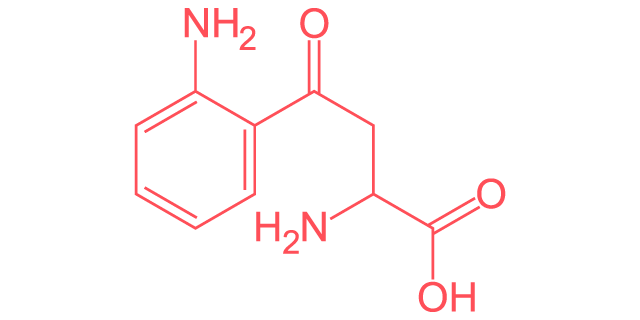Kynurenine

Linear Formula
C10H12N2O3
Synonyms
n/a
Share this metabolite
Kynurenine is the main degradation product of the essential amino acid tryptophan. The human body can produce kynurenine from tryptophan catabolism in the liver via the kynurenine pathway, but it can also take up kynurenine from the diet. Foods high in kynurenine include fermented products such as yogurt and kefir, and plant-derived foods like sesame, algae, multi-flower honey, spike lavender, sunflower, and spirulina. A growing body of evidence suggests that the gut microbiome plays a crucial role in the kynurenine pathway, although the molecular mechanisms are not fully understood.
Once absorbed in the gastrointestinal tract, kynurenine is distributed to different organs, including the brain, and is further degraded. The tryptophan-kynurenine metabolism pathway produces both neuroprotective and neurotoxic metabolites—immune-modulating and energy-providing molecules that significantly impact neurological health, immune responses, brain function, and muscle energy metabolism.
Kynurenine and the gut microbiome
After eating a meal rich in tryptophan, the gut microbiota produce the neurotransmitter serotonin as well as indole and indole derivates. While this ultimately shifts tryptophan degradation away from the kynurenine pathway, a large amount of absorbed tryptophan is transported to the liver and converted to kynurenine and kynurenine metabolites. Since some of these downstream metabolites have toxic functions in the central nervous system and the immune system, achieving the right balance between the serotonin, indole, and kynurenine pathways is crucial.
For example, changes in kynurenine metabolism have been reported in patients suffering from migraines, various neurological diseases, and functional gastrointestinal disorders like celiac and inflammatory bowel diseases 1. A link between an altered gut microbiome, microbial-derived short-chain fatty acids, and increased kynurenine pathway activity has also been reported in cardiometabolic disorders such as type 2 diabetes, hypertension, and heart failure1.
Kynurenine and neurodegenerative disorders
Since the kynurenine downstream metabolites impact emotion, cognition, pain, metabolic function, and aging, the kynurenine pathway has become a crucial focus of neurlogical health research. Notably, the kynurenine pathway produces kynurenic acid, 3-hydroxykynurenine, quinolinic acid, picolinic acid, and nicotinamide adenine dinucleotide. Kynurenic acid was shown to be neuroprotective and anti-inflammatory, while 3-hydroxykynurenine and quinolinic acid reportedly have neurotoxic effects. These compounds can cross the blood-brain barrier and accumulate in the brain. Here, the neurotoxic metabolite triggers inflammation and damages neuronal cells2. Thus, increased activation of the kynurenine pathway and elevated production of kynurenine neurotoxic metabolites has been linked to neurodegenerative diseases, depression, cognitive deficits, anxiety, and suicide attempts3.
Kynurenine and physical exercise
Tryptophan catabolism and the kynurenine metabolic pathway play important roles in providing energy during physical exercise. During exercise training, muscle cells convert kynurenine to the neuroprotective metabolite kynurenic acid and the energy-providing molecule nicotinamide adenine dinucleotide4 This shifts tryptophan catabolism away from the production of the neurotoxic metabolites kynurenic acid and quinolinic acid. Thus, research suggests that the kynurenine metabolism pathway provides the body with energy during physical exercise while it also decreasing inflammatory signals, protecting against neurological damage, and improving neurodegenerative disease outcomes5.
Kynurenine and cancer
As a key regulator of the inflammatory response and energy metabolism, the kynurenine pathway plays a major role in immune system modulation, carcinogenesis, and tumor growth. Several kynurenine metabolites interact with the cellular regulator aryl hydrocarbon receptor, which is present in most human tissues. This interaction can support the molecular processes of carcinogenesis, cancer cell migration, extracellular matrix remodeling, and systemic inflammation.
Research studies have shown that colon cancer cells also produce kynurenine and export the metabolite into the surrounding environment. There, they suppress the immune response and inactivate T-cells, thus supporting the survival of cancer cells6.
A healthy diet, an active lifestyle, and low stress levels were shown to positively influence gut microbiome composition and a balanced kynurenine metabolism. This can further strengthen gut microbiome-immune interactions to regulate gut health and immunity, and potentially inhibit carcinogenesis and tumor growth7.
Kynurenine in research
As of July 2023, there are over 1200 citations for “kynurenine” in research publications (*excluding books and documents) on PubMed. The number of publications linking kynurenine to mental health disorders and also to the gut-brain axis suggests that any researcher interested in the link between this metabolite, brain health, and gut health may consider including quantitative analyses of kynurenine in their studies. Similarly, due to the link between kynurenine and the gut microbiome, any studies aiming to better understand how the microbiome influences health and disease may benefit from kynurenine quantification.
References
- Fila M, Chojnacki J, Pawlowska E, et al. Kynurenine Pathway of Tryptophan Metabolism in Migraine and Functional Gastrointestinal Disorders. Int J Mol Sci 2021;22(18):10134.
- Marszalek-Grabska M, Walczak K, Gawel K, et al. Kynurenine emerges from the shadows – Current knowledge on its fate and function. Pharmacol Ther 2021;225:107845.
- Correia AS and Vale N. Tryptophan Metabolism in Depression: A Narrative Review with a Focus on Serotonin and Kynurenine Pathways. Int J Mol Sci 2022; 23(15):8493.
- Savitz J. The kynurenine pathway: a finger in every pie. Mol Psychiatry 2020;25(1):131-147.
- Martin KS, Azzolini M, and Lira Ruas J. The kynurenine connection: how exercise shifts muscle tryptophan metabolism and affects energy homeostasis, the immune system, and the brain. Am J Physiol Cell Physiol 2020;318(5):C818-C830.
- Venkateswaran N, Conacci-Sorrell M. Kynurenine: an oncometabolite in colon cancer. Cell Stress 2020;4(1):24-26.
- Gao J, Xu K, Liu H, et al. Impact of the Gut Microbiota on Intestinal Immunity Mediated by Tryptophan Metabolism. Front Cell Infect Microbiol 2018; 8:13.

